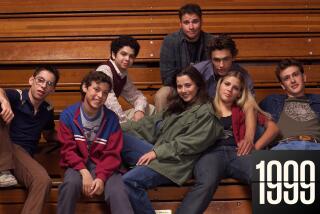A ‘First’ for Him : Jonathan Frakes takes directing controls of the latest ‘Star Trek’ film enterprise.
- Share via
NEW YORK — Christmas came early for Jonathan Frakes this year.
So why shouldn’t he sit here like a little kid would on the year’s most awaited day, his legs tucked up under him on a leather chair at Manhattan’s Hotel Pierre, grinning from ear to ear, savoring every single magic moment?
“Wow!” and “Boy!” keep popping out of his mouth, and his piercingly sky-blue eyes keep getting wider. This may not be the way a Star Fleet officer behaves, or a jaded Hollywood acting veteran, or the director of a $45-million movie blockbuster. And that’s exactly why it’s so disarming to see the 44-year-old Frakes literally giddy with joy in his hotel suite on the morning his feature directing debut, “Star Trek: First Contact,” is opening to rave reviews--and a “Trek”-record $30-million weekend gross.
“I’ve never had a movie before, so this is kind of exciting. It’s like the opening night of a [Broadway] show!” He’s even able to shrug off the fact that one of the few bad reviews appeared in the influential New York Times (calmly and aptly assessing its criticisms as “pretty mean-spirited”). “It’s just been incredible,” he gushes. “And never, ever, have I had the kind of success as an actor as I’m having this week--in my second career.”
He smiles, a bit modestly perhaps, because he knows the industry’s definition of Frakes is changing as we speak. And if it’s hard to know now what his primary career is--acting or directing--he ought to be in demand for both after not only juggling a dual assignment in “First Contact” but displaying unanticipated charm in either case. His supporting performance in the film is far more appealing and relaxed than anything in his seven years co-starring on TV’s “Star Trek: The Next Generation” as Enterprise second-in-command Will Riker. “I wonder,” says the Bethlehem, Pa., native, “if that’s ‘cause I was, uh, otherwise occupied.”
Maybe it’s because what he was otherwise occupied doing was injecting some much-needed zest into Paramount’s “Star Trek” franchise, which has so puffed itself up with cosmic importance over the past few years that it threatened to burst its own bubble of success. TV’s syndicated “Next Generation” series (1987-94) arguably improved over its ‘60s NBC predecessor with more thoughtful stories and sharper production values, but many felt the concurrent big-screen films with the ‘60s TV cast led by William Shatner and Leonard Nimoy were becoming bloated and self-important. Meanwhile, TV’s subsequent “Trek” series--”Deep Space Nine” (launched in 1993) and “Voyager” (begun last year)--were having problems pleasing the faithful.
The bloom was so off the endlessly spouting “Trek” seed that “people keep reminding me that the future of the franchise is on my shoulders,” Frakes says, facing fears the “Next Generation” cast might not be up to the task of flying solo to replace the venerable Shatner-Nimoy crew as Paramount’s big-screen “Trek” attraction.
*
Frakes’ solution? Make a nod to the enduring mood of the original ‘60s show, while emphasizing the specific charms of his own company, letting each performer shine in ways the previous “Generations” film hadn’t.
It’s no accident that nearly all the “First Contact” reviews emphasized his movie’s energy and good humor, displayed in brisk interactions between the familiar “Next Generation” crew and their three well-chosen guest stars: Alfre Woodard and James Cromwell, playing the scruffy heroes of a 21st century Earth dark age the crew visits via time travel, and Alice Krige, as the seductive queen of the evil cybernetic Borg race.
“We tried to bring the fun back,” Frakes says. “I mean, one of the great charms of the original ‘Star Trek’ was that relationship that Kirk and Spock and Bones had, where they would kid each other, really, and be ironic and sarcastic, and kind of jab each other in the ribs. And while we don’t have that type of relationship, I think a laugh every few minutes in a film that is supposed to be a tense action-adventure is only gonna help. Audiences wanna laugh. And if you take yourself too seriously, it’s just the kiss of death, isn’t it?”
This is certainly no stoic man sitting in this hotel suite. Upon being reminded of credits that others might prefer to obscure--like playing the cad hillbilly Jamie Lee Hogg on the legendarily dumb TV series “The Dukes of Hazzard”--Frakes bursts into hysterical giggles.
“Isn’t that scary?” he says as the chuckles subside. “I did a lot of TV. Some good. Some not so good. That’s all I used to do, guest spots on TV shows. I was a big guest villain on all the hour dramas--’The Waltons,’ ‘Barnaby Jones,’ ‘Quincy.’ I used to play drug dealers, father-killers, ne’er-do-wells.”
He also chalked up a legion of melodramatic miniseries roles, in titles like “Beulah Land,” “Bare Essence” (where he met wife Genie Francis of “General Hospital” Luke-and-Laura fame) and “North and South” (where he actually fell in love with her). All of which must have been more fun than stoic Will Riker. “I thought they were great. But they all ended in a week, those jobs.”
*
Riker lasted for seven seasons. But more important during that time, Frakes managed to persuade “Trek” lord Rick Berman to indulge his desire to try directing. He would helm eight “Next Generation” episodes--including several of the series’ most acclaimed--and move on behind the camera to the two newer “Trek” series and other hour dramas. Still, with only 20 hours of TV directing behind him, he was hardly the obvious choice to take command of a $45-million make-or-break movie.
The script had been written by the time he was finally brought on board in January, but his additions were telling: crowd-pleasing cameo appearances by such familiar “Trek” faces as Robert Picardo (the holographic “Voyager” doctor who plays the same role here), Ethan Phillips (unbilled in his holodeck scene walk-on and possibly unrecognizable without his “Voyager” Neelix makeup) and Dwight Schultz (repeating his role as perennial phobic Barclay).
And like actor-turned-director Nimoy before him, Frakes threw himself with gusto into simultaneously honoring and mocking “Trek” mythology.
He also proved a surprisingly confident master of big-screen scope and special effects, right from the opening sequence--a breathtaking zoom back from Stewart’s eyeball through space to a “hive” of the interdependent Borg race. The scene set a tone of relentless action, with Frakes drawing inspiration not from the “Trek” milieu at all, he confesses, but from such other, more muscular and enduring fantasy-adventure movies as “Alien” and “Jaws,” even “2001: A Space Odyssey.”
That breakneck activity is precisely what also allows Frakes to turn the spotlight at some point to each of his Enterprise crew members, whose resentment of their wallpaper status in “Generations” was very publicly expressed. “I think if you have that kind of pace that we have in the movie, you can take time to have sort of a pressure-valve release with those laughs. And you can also take time for those scenes like the Ahab scene that Alfre and Patrick have.”
He says he’s proudest of that one, with its intense matching of wits, of “two great actors dukin’ it out.” But not far away during the same conversation, Frakes claims the movie’s humor actually proved most rewarding. “I’m proudest of the fact that there are laughs in this movie. The most thrilling part of being at the premiere was to listen to an audience in the dark laugh at what you hoped were jokes.”
More to Read
Only good movies
Get the Indie Focus newsletter, Mark Olsen's weekly guide to the world of cinema.
You may occasionally receive promotional content from the Los Angeles Times.







